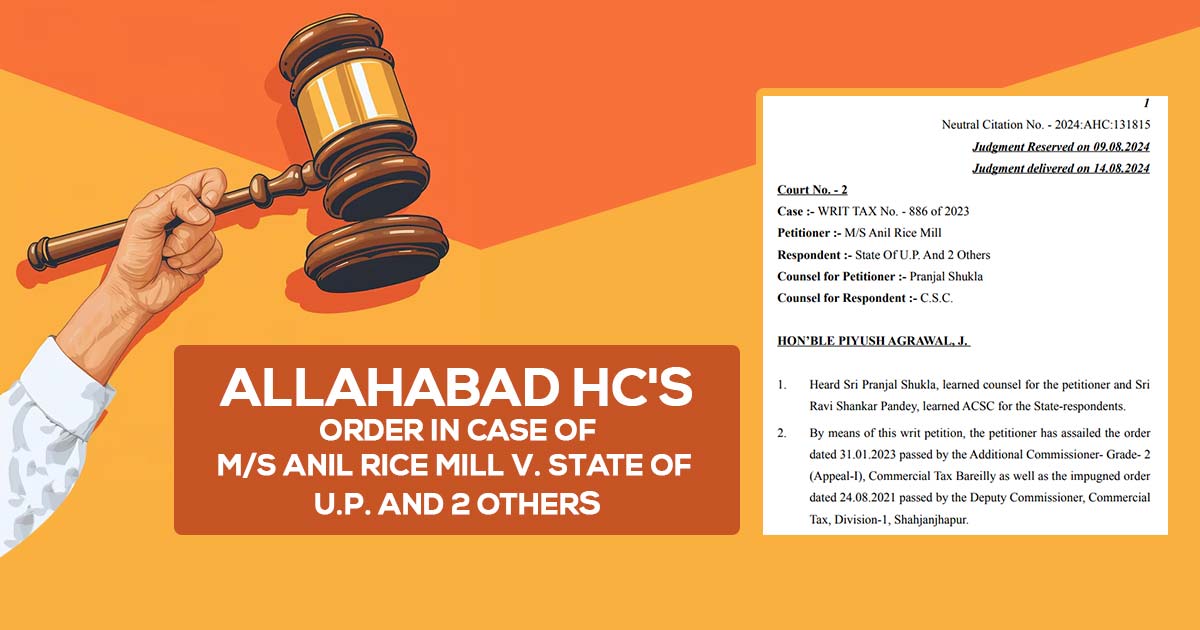
It was ruled by the Allahabad HC that the production of tax invoice, e-way bill, GR, or payment details is not enough to show the actual physical movement of the transaction for the objective of claiming the ITC u/s 16 of the Goods and Service Tax Act, 2017.
Section 16 of the Goods and Service Tax Act, 2017 furnishes the conditions and eligibility to avail of ITC. Section 16(2) provides that a taxpayer is not authorized to any input tax credit unless he has tax invoices or debit notes issued by a supplier and any other tax-paying documents as may be specified.
The proper officer has been authorized by section 74 of the GST act to discover the tax and penalty in which the tax is not being paid or short paid or incorrectly refunded or ITC claimed incorrectly or used via a taxpayer by fraud or any wilful misstatement or suppression of facts.
Factual Background
Petitioner is in the business of reselling and purchasing Peanut, Galla, and Paddy. The petitioner was issued a notice u/s 74 of the GST Act for unlawful ITC claims for June, July, August, and September 2020-21. Thereafter, an order was passed denying the petitioner’s response and charging a tax liability of Rs 20,31,775 and a penalty of an equal amount.
The counsel of the applicant contesting the order claimed that the goods were purchased via proper invoices and the payments were incurred via banking channel via the applicant. It was claimed that only due to the selling dealer being unable to show the purchases, no penalty is to be levied on the applicant.
It claimed that the objective of drawing GST was to prevent the cascading effect of taxes, hence once the tax has been filed against the GST invoice then the applicant cannot be refused for the ITC. Also, it claimed that recovering the ITC amount claimed by the applicant shall amount to double taxation.
Respondent’s counsel- It was claimed by the department that the ITC was claimed on the grounds of the bogus invoices. It claimed that ITC cannot be claimed without the actual movement of goods. It was claimed that the obligation to prove the genuineness of the transaction was on the applicant which it was unable to release.
High Court Verdict
It was remarked by Justice Piyush Agrawal that the applicant has merely brought on record the tax invoices, e-way bills, and payment through banking channel, but no such details such as payment of freight charges, acknowledgement of taking delivery of goods, toll receipts and payment thereof have been provided.
The court noted that the applicant had not brought on record any filing proof of GSTR 2A. Applicant loses to prove the actual physical movement of the goods and the genuineness of the transactions can not be confirmed.
The court has laid on the Apex courts decision in State of Karnataka Vs. M/s Ecom Gill Coffee Trading Private Limited, and ruled that for proving the genuineness of the transactions to claim the ITC, the taxpayer would required to prove its claim beyond doubt by providing the details of the “selling dealer, vehicle number, payment of freight charges, acknowledgement of taking delivery of goods, tax invoices and payment particulars etc” which demonstrate the actual physical movement of the goods.
The writ petition has been dismissed by the court by marking that the applicant has failed to prove the genuineness of the transactions without suspicion.
| Case Title | M/S Anil Rice Mill Vs. State Of U.P. And 2 Others |
| Citation | WRIT TAX No. – 886 of 2023 |
| Date | 14.08.2024 |
| Counsel for Petitioner | Pranjal Shukla |
| Counsel for Respondent | C.S.C. |
| Allahabad High Court | Read Order |









